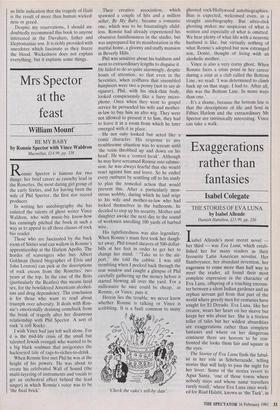Mrs Spector at the feast
William Mount
BE MY BABY by Ronnie Spector with Vince Waldron Macmillan, £14.99, pp. 338 Ronnie Spector is famous for two things: her brief career as raunchy lead in the Ronettes, the most daring girl group of the early Sixties, and for having been the wife of Phil Spector, the first star record producer.
In writing her autobiography she has enlisted the talents of ghost writer Vince Waldron, who with music-biz know-how has cunningly pitched the book in such a way as to appeal to all three classes of rock bio reader.
Those who are fascinated by the back room of Sixties soul can wallow in Ronnie's apprenticeship at the Harlem Apollo. The hordes of scavengers who buy Albert Goldman (hated biographer of Elvis and John Lennon) can pick at the descriptions of rock excess from the Ronettes' two years at the top. In the case of the Brits (particularly the Beatles) this means lurid sex, for the bewildered Americans alcohol- ism and drug dependency. The conclusion is for those who want to read about triumph over adversity. It deals with Ron- nie's emotionally draining comeback from the brink of tragedy after her disastrous relationship with Phil Spector. A sort of rock 'n roll Rocky.
I wish Vince had just left well alone. For it is the mid-life crisis of the small but talented Jewish svengali who wanted to be a big black soulman that invigorates the hackneyed tale of rags-to-riches-to-drink.
When Ronnie first met Phil he was at the height of his powers. He was about to create his celebrated Wall of Sound (the multi-layering of instruments and vocals to get an orchestral effect behind the lead singer) in which Ronnie's voice was to be 'the final brick'. Their creative association, which spawned a couple of hits and a million seller, Be My Baby, became a romantic one, which was to be frustratingly child- less. Ronnie had already experienced his obsessive fastidiousness in the studio, but was unprepared for its manifestation in the marital home, a gloomy and stuffy mansion in Beverly Hills.
Phil was sensitive about his baldness and went to extraordinary lengths to disguise it. He failed to do so quite alarmingly, despite hours of attention, so that even in the Seventies, when coiffures that resembled hairpieces were two a penny (not to say de rigueur), Phil, with his stick-thin body, looked conspicuously like a furry micro- phone. Once when they went to gospel service he persuaded his wife and mother- in-law to buy him an afro wig. They were not allowed to present it to him, they had to leave it in a room from which he later emerged with it in place.
He not only looked but acted like a comic character. His response to any troublesome situation was to scream until 'the veins throbbed up and down on his head'. He was a 'control freak'. Although he may have screamed Ronnie into submis- sion, he was always fearful that she would react against him and leave. So he ended every outburst by scuttling off to his study to plan the remedial action that would prevent this. After a particularly mon strous wobbly, during which he laid seige to his wife and mother-in-law who had locked themselves in the bathroom, he decided to step up his security. Mother and daughter awoke the next day to the sound of workmen unrolling 100 yards of barbed wire.
His tightfistedness was also legendary. When Ronnie's mum first took her daugh- ter away, Phil tossed sheaves of 500-dollar- bills at her feet in order to get her to change her mind. "Take us to the air- port," she told the cabbie. I was still trembling when I peeked back through the rear window and caught a glimpse of Phil carefully gathering up the money before it started blowing all over the yard. For a millionaire he sure could be cheap,' as Ronnie, or Vince, puts it.
Herein lies the trouble: we never know whether Ronnie is talking or Vince is scribbling. It is a fault common to many
'Check the cake's sell-by date'. ghosted rock/Hollywood autobiographies. Bias is expected, welcomed even, in a straight autobiography. But ultra-slick ghosting makes me suspicious of what is written and especially of what is omitted. We hear plenty of what life with a neurotic husband is like, but virtually nothing of what Ronnie's adopted but now estranged son, Donte, thought of living with an alcoholic mother.
Vince is also a very corny ghost. When Ronnie faces a crisis point in her career during a stint at a club called the Bottom Line, we read: 'I was determined to climb back up on that stage. I had to. After all, this was the Bottom Line. In more ways than one.'
It's a shame, because the bottom line is that the descriptions of life and Soul in Fifties Harlem and the extraordinary Mr Spector are intrinsically interesting. Vince can take a walk.


















































 Previous page
Previous page